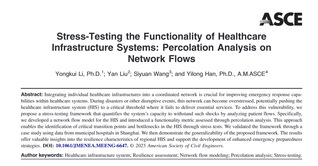摘要
Integrating individual healthcare infrastructures into a coordinated network is crucial for improving emergency response capabilities within healthcare systems. During disasters or other disruptive events, this network can become overstressed, potentially pushing the healthcare infrastructure system (HIS) to a critical threshold where it fails to deliver essential services. To address this vulnerability, we propose a stress-testing framework that quantifies the system's capacity to withstand such shocks by analyzing patient flows. Specifically, we developed a network flow model for the HIS and introduced a functionality metric assessed through percolation analysis. This approach enables the identification of critical transition points and bottlenecks in the HIS through stress tests. We validated the framework through a case study using data from municipal hospitals in Shanghai. We then demonstrate the generalizability of the proposed framework. The results offer valuable insights into the resilience characteristics of regional HIS and support the development of enhanced emergency preparedness strategies.





